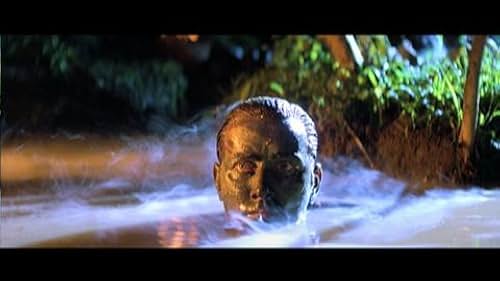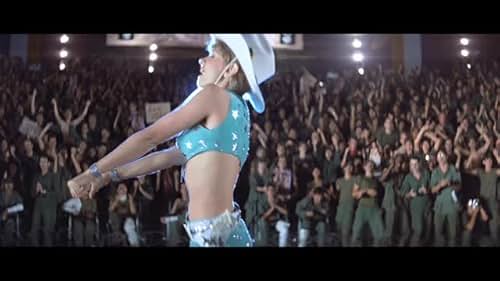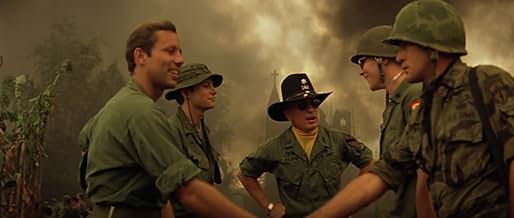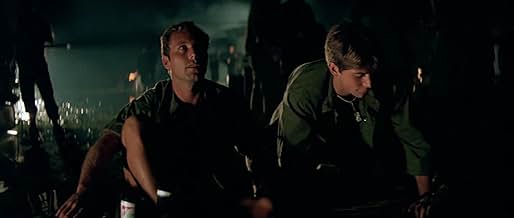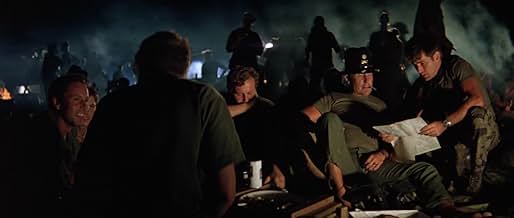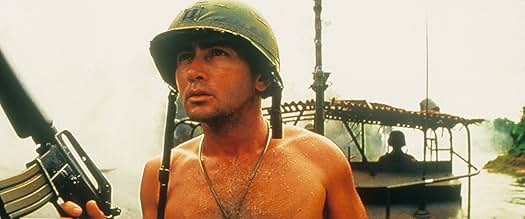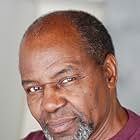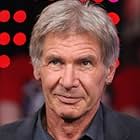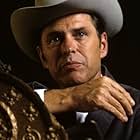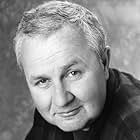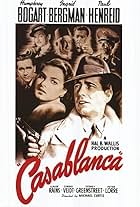A U.S. Army officer serving in Vietnam is tasked with assassinating a renegade Special Forces Colonel who sees himself as a god.A U.S. Army officer serving in Vietnam is tasked with assassinating a renegade Special Forces Colonel who sees himself as a god.A U.S. Army officer serving in Vietnam is tasked with assassinating a renegade Special Forces Colonel who sees himself as a god.
- Won 2 Oscars
- 21 wins & 33 nominations total
Laurence Fishburne
- GM3 Tyrone 'Clean' Miller
- (as Larry Fishburne)
Storyline
Did you know
- TriviaMore than a year had passed between the filming of Willard and Chef searching the jungle for mangoes and encountering the tiger, and the immediately following shots (part of the same scene) of Chef clambering back onto the boat, ripping off his shirt and screaming.
- GoofsWhen Captain Willard first meets Colonel Kilgore, they exchange salutes while they are still in a combat zone. It is usually military protocol not to salute in a combat zone. Saluting would show a possible sniper who the commanding officer is. (e.g. in Forrest Gump (1994) Lt. Dan correctly instructed Gump and Bubba not to salute him in the field.)
- Crazy creditsThere are no opening credits in the film. The title can be seen as graffiti in the Kurtz compound late in the film.
- Alternate versionsThe theatrical and Redux DVDs released by Paramount Pictures and Lions Gate Studios in the United States, as well as the earlier letterbox VHS and LaserDisc releases, were re-framed in DP Vittorio Storaro's preferred 2.00:1 "Univision" format. The Lions Gate US Blu-ray release, however, restores the film's original 2.39:1 aspect ratio (although the packaging reads 2.35:1).
- ConnectionsEdited into Apocalypse Pooh (1987)
- SoundtracksThe End
by Jim Morrison (as The Doors), Ray Manzarek (as The Doors), Robby Krieger (as The Doors), and John Densmore (as The Doors)
Performed by The Doors
Courtesy of Elektra/Asylum Records
Featured review
In an updating of `Hearts of Darkness' a soldier is given a mission to travel up a river During the Vietnam war in order to terminate the command of Colonel Kurtz. Kurtz is operating without orders and is leading a group of natives in brutal violent strikes against the enemy. Despite his history of brilliance and decoration he has clearly gone mad. Willard joins a military boat and travels up river to his destiny. However the further he travels the more madness appears to have become the norm.
That Redux was going to be anything less than brilliant was never in doubt: it was never going to be so different from the original that it would destroy or significantly damage the reputation or impact that the film has. What was in question to my mind was whether or not Coppola should have just left well enough alone. I have seen the documentary about the making of the original film, wherein Coppola derides many of his scenes and decides to cut them out of his movie even as he finishes shooting them - the plantation scene being one of the key ones that he felt just didn't work. It was for this reason that I was interested to see what the additions and rejigging of scenes had done to the film.
The strengths of Redux is that Apocalypse Now was never about the straight story, it was more about the journey Willard undertakes rather than a build up to a traditional conclusion - while the ending is big, it is no more or less important that anything that has gone before it. So for that reason it is a good thing that, simply put, there is now more of the journey to be enjoyed! `49 minutes of new material' my dvd cover screams at me; combine this with the movement of scenes and certainly it does have the feel of a different (albeit familiar) film rather than just a bit of spit and polish with some new CGI effects (yes ET, I'm looking at you). However this increased material also brings with it the problems that not all the material compliments the film in terms of total quality.
None of the added scenes or sequential movements are bad or even average, they are all interesting, but some just don't seem to really fit. The plantation scene has some great dialogue (that strikes a real chord so recently post-Iraq) and it makes it's points but it just didn't seem to fit. I can see what Coppola was trying to do and, if you watch Hearts Of Darkness, you can see that it frustrates him that it doesn't work, but he got it right first time, it doesn't fit despite it's standalone merits. Likewise the playboy bunny scene intrigued me as I tried to get more from the bunny's semi-speech about being made to do things and the theme of objectification, but again it didn't totally work and seemed out of place.
Despite these two major scenes not totally fitting, they are still interesting and, if you came for the journey, then that is what matters and they present themselves as a flawed part of that journey - but a part of that journey nonetheless. Some of the smaller additions actually contribute a lot more to the film. Little moments in the boat show Willard to be more relaxed as a man than the original did - and this greatly benefits my understanding and appreciation of his character. How he interacts with the rest of the crew is also improved. Other minor additions to existing scenes serve to enhance them, but improvement in some areas is difficult when it comes to this film.
I won't go into details on cast, performances and the themes of the film as I have already done that in my other review. Suffice to say that, if you loved Apocalypse Now then Redux will likely both enhance your enjoyment and slightly irritate you at the same time. The film easily stands up to the longer running time - as another user said, I could easily give the five hour version a stab (well, maybe once!) as the journey is the all. The additions may not be without flaw, but then that's why they were higher on the editing hierarchy than the rest of the stuff! However they add interest and minutes to the journey - both of which are good things.
Overall, it is very difficult to take `one of the best films ever madeT ' and make it better - and Coppola hasn't done that here, but he hasn't damaged it either. It isn't a brand new film and it doesn't mess around with the original so much that it could be called a different film - so I won't compare the two as to which is `better'. Suffice to say that, while I don't totally agree that you `can't have too much of a good thing', certainly an extra 49 minutes is gratefully received where it doesn't damage or cheapen but only seeks to enhance and support.
That Redux was going to be anything less than brilliant was never in doubt: it was never going to be so different from the original that it would destroy or significantly damage the reputation or impact that the film has. What was in question to my mind was whether or not Coppola should have just left well enough alone. I have seen the documentary about the making of the original film, wherein Coppola derides many of his scenes and decides to cut them out of his movie even as he finishes shooting them - the plantation scene being one of the key ones that he felt just didn't work. It was for this reason that I was interested to see what the additions and rejigging of scenes had done to the film.
The strengths of Redux is that Apocalypse Now was never about the straight story, it was more about the journey Willard undertakes rather than a build up to a traditional conclusion - while the ending is big, it is no more or less important that anything that has gone before it. So for that reason it is a good thing that, simply put, there is now more of the journey to be enjoyed! `49 minutes of new material' my dvd cover screams at me; combine this with the movement of scenes and certainly it does have the feel of a different (albeit familiar) film rather than just a bit of spit and polish with some new CGI effects (yes ET, I'm looking at you). However this increased material also brings with it the problems that not all the material compliments the film in terms of total quality.
None of the added scenes or sequential movements are bad or even average, they are all interesting, but some just don't seem to really fit. The plantation scene has some great dialogue (that strikes a real chord so recently post-Iraq) and it makes it's points but it just didn't seem to fit. I can see what Coppola was trying to do and, if you watch Hearts Of Darkness, you can see that it frustrates him that it doesn't work, but he got it right first time, it doesn't fit despite it's standalone merits. Likewise the playboy bunny scene intrigued me as I tried to get more from the bunny's semi-speech about being made to do things and the theme of objectification, but again it didn't totally work and seemed out of place.
Despite these two major scenes not totally fitting, they are still interesting and, if you came for the journey, then that is what matters and they present themselves as a flawed part of that journey - but a part of that journey nonetheless. Some of the smaller additions actually contribute a lot more to the film. Little moments in the boat show Willard to be more relaxed as a man than the original did - and this greatly benefits my understanding and appreciation of his character. How he interacts with the rest of the crew is also improved. Other minor additions to existing scenes serve to enhance them, but improvement in some areas is difficult when it comes to this film.
I won't go into details on cast, performances and the themes of the film as I have already done that in my other review. Suffice to say that, if you loved Apocalypse Now then Redux will likely both enhance your enjoyment and slightly irritate you at the same time. The film easily stands up to the longer running time - as another user said, I could easily give the five hour version a stab (well, maybe once!) as the journey is the all. The additions may not be without flaw, but then that's why they were higher on the editing hierarchy than the rest of the stuff! However they add interest and minutes to the journey - both of which are good things.
Overall, it is very difficult to take `one of the best films ever madeT ' and make it better - and Coppola hasn't done that here, but he hasn't damaged it either. It isn't a brand new film and it doesn't mess around with the original so much that it could be called a different film - so I won't compare the two as to which is `better'. Suffice to say that, while I don't totally agree that you `can't have too much of a good thing', certainly an extra 49 minutes is gratefully received where it doesn't damage or cheapen but only seeks to enhance and support.
- bob the moo
- Mar 26, 2004
- Permalink
Details
- Release date
- Country of origin
- Official sites
- Languages
- Also known as
- Apocalipsis ahora
- Filming locations
- Baler Bay, Baler, Aurora, Philippines(beach with soldiers surfing)
- Production companies
- See more company credits at IMDbPro
Box office
- Budget
- $31,500,000 (estimated)
- Gross US & Canada
- $96,042,913
- Opening weekend US & Canada
- $118,558
- Aug 19, 1979
- Gross worldwide
- $105,086,099
- Runtime2 hours 27 minutes
- Aspect ratio
- 2.39 : 1
Contribute to this page
Suggest an edit or add missing content


